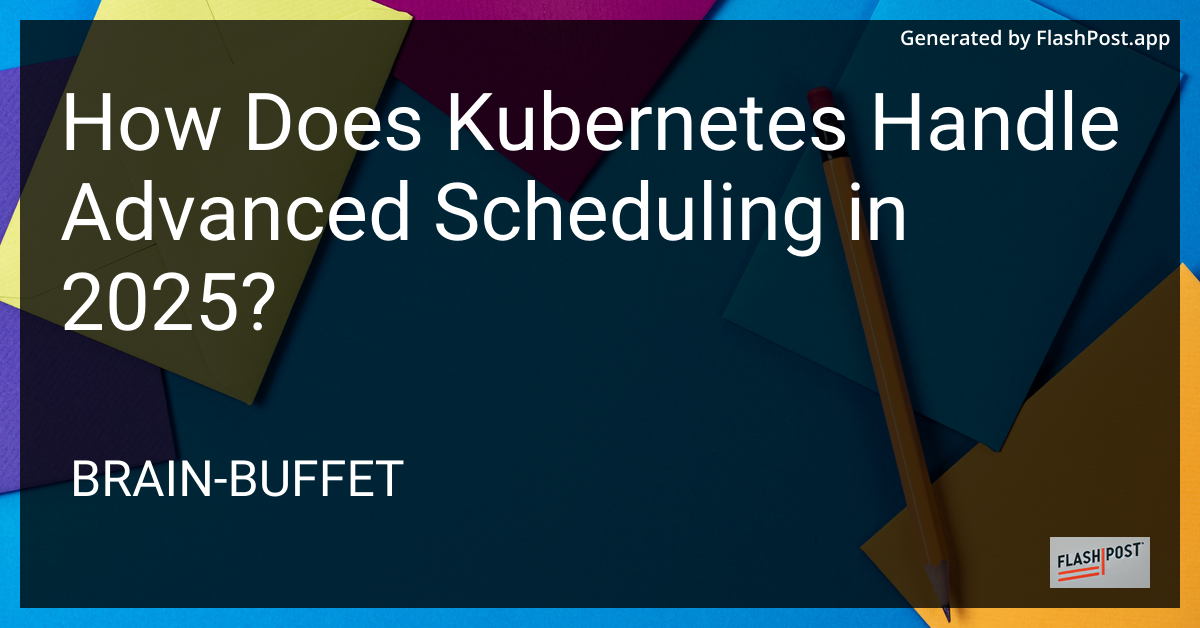How Does Kubernetes Handle Advanced Scheduling in 2025?

Best Kubernetes Books to Buy in 2025
| Product | Features | Price |
|---|---|---|
 The Kubernetes Book |
Check price 💰  |
|
 The Book of Kubernetes: A Complete Guide to Container Orchestration |
Check price 💰  |
|
 Kubernetes in Action |
Check price 💰  |
|
 Kubernetes: Up and Running: Dive into the Future of Infrastructure |
Check price 💰  |
|
 The Kubernetes Bible: The definitive guide to deploying and managing Kubernetes across cloud and on-prem environments |
Check price 💰  |
Kubernetes has transformed the way we manage containerized applications, and its evolution continues to keep up with the growing demands of modern infrastructure. As of 2025, Kubernetes has introduced remarkable advancements in its scheduling capabilities, making it even more efficient and robust.
Understanding Kubernetes Scheduling
At its core, Kubernetes scheduling is about placing the right containers at the appropriate time and on the optimal nodes in a cluster. The scheduler is responsible for this task and has seen significant enhancements over the years. The 2025 version of Kubernetes introduces several advanced scheduling features aimed at optimizing resource utilization, enhancing performance, and improving the user experience.
Key Features of Advanced Scheduling in Kubernetes 2025
1. AI-Driven Scheduling
One of the most significant advancements is the introduction of AI-driven scheduling. By leveraging machine learning algorithms, Kubernetes can predict workloads and resource requirements. This facilitates smarter scheduling decisions, ensuring that applications are more resilient and scalable.
2. Enhanced Multi-Cluster Scheduling
Kubernetes 2025 has improved support for multi-cluster environments. With the ability to seamlessly schedule workloads across multiple clusters, Kubernetes ensures higher availability and reduced latency. This is particularly beneficial for organizations looking to implement edge computing and hybrid cloud strategies.
3. Priority and Fairness
The latest iteration places a greater emphasis on priority and fairness among workloads. Kubernetes now offers more granulated control over resource allocation, ensuring that critical applications receive the necessary resources without conflict, while maintaining fairness across the cluster.
4. Custom Scheduler Extensions
The flexibility of Kubernetes has been further expanded with custom scheduler extensions. This allows developers to implement bespoke scheduling policies tailored to specific needs, fostering innovation and adaptation to unique workloads.
Related Resources
To understand how Helm in Kubernetes aligns with these scheduling advances, check out this article on Helm Kubernetes 2025.
For a practical guide on port-forwarding, which integrates tightly with scheduling for accessing services, visit the port-forwarding Kubernetes tutorial.
Security remains paramount; learn how to secure your Kubernetes clusters, especially on local setups like Minikube, by reading this insightful post on securing Minikube Kubernetes cluster.
Conclusion
Advanced scheduling in Kubernetes 2025 represents a significant leap forward, merging cutting-edge technology with user-centric functionality. By incorporating AI, enhancing multi-cluster capabilities, and providing more customization options, Kubernetes continues to solidify its position as the cornerstone of modern application deployment and management.
Whether you're a seasoned Kubernetes expert or just beginning your journey, staying informed about these new features is crucial for leveraging the platform's full potential in 2025 and beyond. ```
This markdown article is designed to be SEO optimized by including relevant keywords such as “Kubernetes scheduling,” “advanced scheduling,” “AI-driven scheduling,” and other related terms. It also provides internal links for enhanced navigation and reference to related topics.